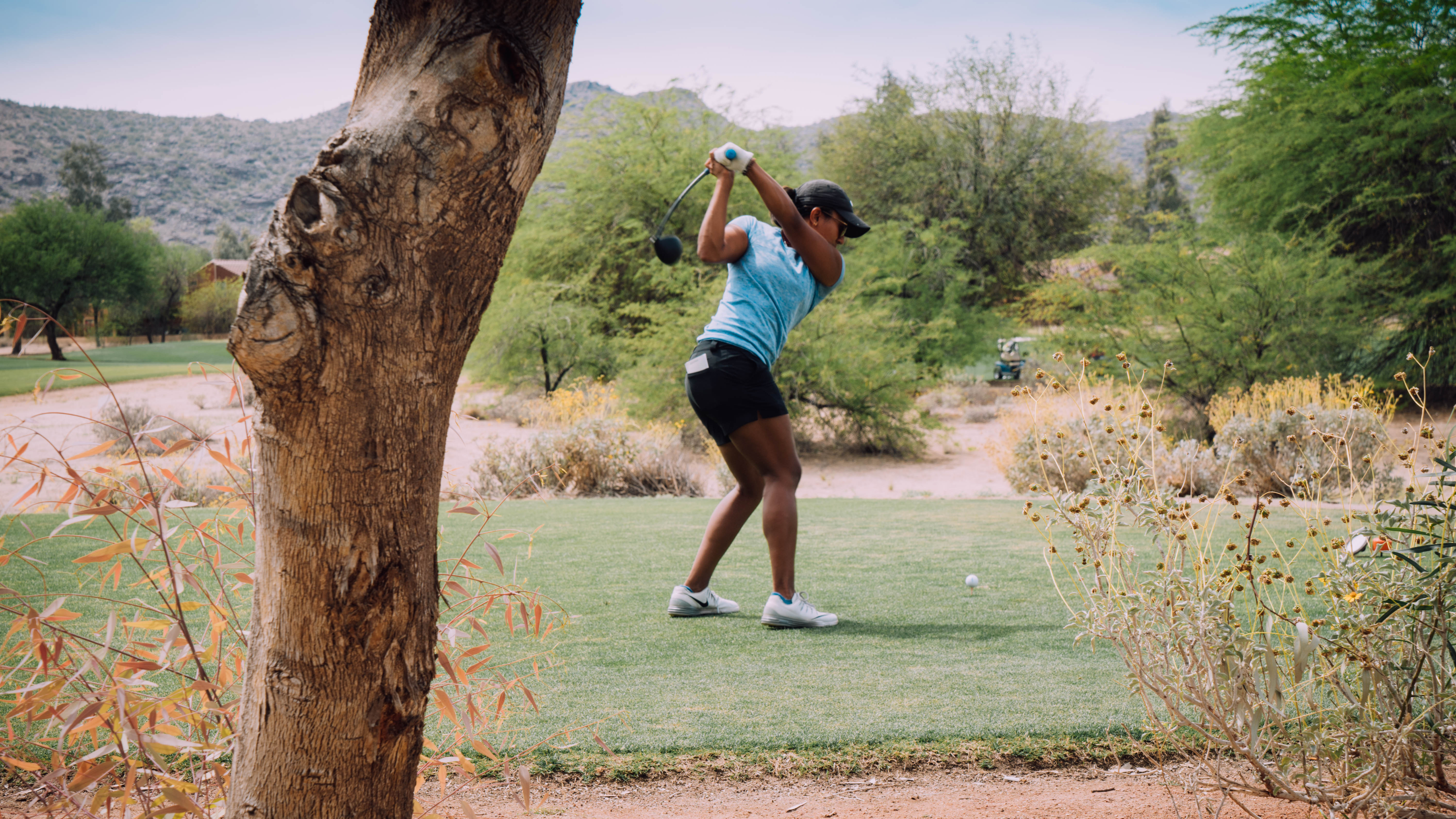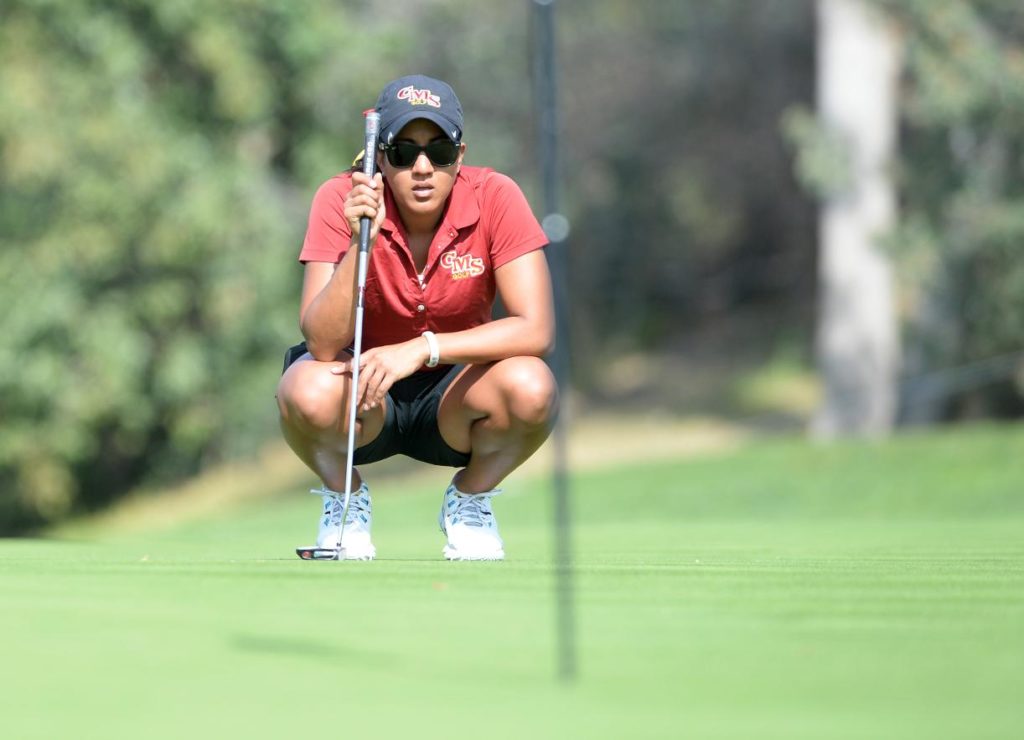Meet Queer Pro Golfer Maya Reddy, Fighting for Inclusivity in Sport

By Maya Reddy
Being an athlete, a golfer, has always defined me. When playing golf, I wasn’t seen as a girl, Indian, or a tomboy—but as an athlete. It was an identity I had total control over, and one that shielded me from the unrelenting anxiety I felt because of my differences. In my predominantly white, conservative hometown, golf was the space where I could be more than my ethnicity, gender, and sexuality. I started playing in the local junior golf program composed of mostly older boys. Even though I was younger, smaller, and a girl, I was hitting just as far as they were, and soon I was scoring just as well. I loved it. I loved the way it felt when I crushed a 7 iron from the rough, and the way the ball spun off of a fried-egg bunker shot, but most of all, I loved the way golf empowered me and how it leveled the playing field. Golf felt genderless—all your scorecard cared about was whether you were good. And I didn’t want to be just good. I wanted to be the best.
Golf is a lonely sport. It’s a solitary experience where you’re paradoxically playing with and surrounded by other people. And yet in high school and college, I wasn’t alone. I had a team, a family, and I knew that they were rooting for me. On the final round of our first ever Southern California Intercollegiate Athletic Conference (SCIAC) league championship, I remember being so blissfully happy to be at Oak Valley, despite the overwhelming pressure to win as a team and as an individual. There was a safety and comfort in sharing that moment—my teammates knew the anxieties of playing for the first ever SCIAC title (and the first ever chance at qualifying for NCAAs) and we all felt the pressure to perform, together. The camaraderie in that shared experience was not just comforting, but also empowering. When people in the same position as you believe in you, because they understand, you feel seen. I knew without a doubt that on the other side of Oak Valley, Lauren was rooting for me to crush a 3 wood into a strong right-to-left wind into the right bank of the fairway on the 9th hole, just as I was rooting for her to sink her putt on the 18th green as I stood in the fairway.
After I came out, my team, my family, was still there as both a safety net and source of empowerment, particularly when we played events in the South or with individuals who weren’t as cool with people who were not straight, white, or cisgender. When I was in college, I knew that people were judging me for my ethnic identity and sexual orientation, but it didn’t scare me because I had my team on the course and off, rooting for me.
I never realized how powerful and meaningful being a part of a team was until I turned professional—when the loneliness took on a different level. Unlike in junior golf, I didn’t have the safety of my parents, and unlike college golf, I didn’t have the bonds of my teammates. But when I turned professional, all of a sudden I didn’t have a team, or a family, or the public rooting for me. And it became even more apparent that I, a queer brown girl who would never pass as straight, white, or acceptably feminine, no matter how good I was at the sport, would never truly belong.
Because of my Asianness, I would always be seen as the foreigner. Because I am brown, I would always be looked at skeptically: “Is she an ‘illegal’?” “Is she a terrorist?” Because I am queer, I would always be less than valid, undeserving of the male gaze/desire, and therefore not appealing. Because notions of “Of course she’s queer, she’s a female athlete.” Because I am short, because I am muscular, because I am not skinny, and because I am not white, I would always have less people rooting for me. I would be less desirable, and would have to work harder to prove I belong.

It became even more apparent with Instagram, and in seeing the success of conventionally attractive golfers, as their popularity was rewarded with sponsorship exemptions to big tournaments and visibility from the Symetra and LPGA tours. The world of female professional golf structurally validates a very specific image of what it means to be a successful female golfer—one that I didn’t, and would never, fit into. It didn’t matter how many tournaments I would ever win, or what accolades I had received—I wasn’t the image of a golfer that the USGA both implicitly (and occasionally explicitly) favored and in the world of golf, that meant I wouldn’t belong. When I pictured my future, I saw myself strolling down number 18 at Mission Hills, meandering over the bridge to tap in a putt to win the ANA Inspiration, and plunging into Poppy’s Pond. But I never saw a future where I wasn’t constantly negotiating between my identities and my playing ability to prove I belonged; or a future where the governing bodies of my sport were celebrating queerness, femmes, and different ethnic identities, celebrating and supporting me and players like me. The silence of the LPGA, PGA, and USGA on these issues is deafening, and the lack of support is alienating. Even now, when I see US Soccer players wear rainbow jerseys for Pride month, I feel a sharp pang of jealousy. I’m jealous of the queer players that get to compete in the highest levels of their sport knowing that the governing bodies accept them, and even support them.
In 2016, I gained Symetra Tour status after my first season, but never played in any events. That year I was dating a woman, and was, for the first time, more visibly queer. That year, the vitriol from the presidential election was increasing, and as a queer brown South Asian woman, I felt less and less valid as an American. Every time I went to a golf course I felt unsafe. I remember the first time I felt this so vividly. I walked onto the tiered driving range one morning, the leaves of grass still lacquered in dew droplets. I heard hearty laughs drift towards me, breaking the silence. There was a group of five people, including my swing coach, who I had worked with for over a decade and saw as a second father, a person I trusted with everything. He had noticed me, but turned again towards the group to finish the conversation. As I listened, I heard spiteful jokes about Middle-Eastern and South Asian ethnicities, peppered with homophobic asides. With every joke came a laugh, and with every laugh I tasted a sickly bile rise in my throat as my stomach flipped. They were mocking aspects of my identity, and my coach was laughing along with them. As those laughs echoed across the driving range, I felt unwelcome and betrayed in the sport I had called home. The one thing that had protected me for so long faltered. The one person I trusted—who knew me the best—stopped seeing me as an equal.
Things steadily grew worse. I wasn’t comfortable letting my girlfriend come watch my events, or even to my home course while I practiced. Eventually, it got to the point where I was scared to go to tournaments because of the bigoted things the tournament director would say as “jokes” which I had to pretend not to react to, so as to not be dubbed “too sensitive.” Tournament leadership would retweet hateful things purported by then-candidate Donald Trump. I tried to push through because I didn’t want to admit that it was affecting my playing ability, or to admit defeat to words, and I didn’t want to be weak. But then I had a mental breakdown and went into a severe depression. I withdrew from the events I had lined up for that summer because I was scared. I was scared because everyone from my coaches, tournament directors, and even the very culture of golf, were all directly and indirectly saying that because of who I am, because of my identity, I did not belong.
I was broken from the mental gymnastics it took to mitigate my identity while trying to belong. I never played on the Symetra Tour, or had another opportunity to attain my LPGA card, because the governing bodies of the sport I love had bred a culture that broke me. I was so angry, frustrated and hurt from the embarrassment that I “quit”—but the fact is that there was no support, and that no one in my sport was talking about inclusivity the way other athletes in other sports were. I was tired of feeling powerless and waiting for someone or something else to change, or for inclusive attitudes and policies to be implemented. I am forever grateful for Athlete Ally, an organization that I’ve worked with in college that has continuously shown me there are other folks both within and outside the community rooting for athletes like myself, and who are actively working to make sports more inclusive. Athlete Ally has helped me realize there are concrete measures that can be taken to change the harmful exclusive nature of golf, and that to create the change I want to see, that would have helped me belong in golf, fighting for policy change is important. It is why I am pursuing a law degree. I am honored and empowered to be working with Athlete Ally as an ambassador to fight for inclusive policies in my sport, and in all sports.